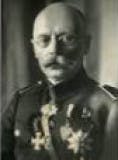Bajor, landlord, public and cultural figure, writer, book carrier, pioneer of fisheries in Lithuania.
Hailed from an old noble family of Samogitia. Vladas Putvinskis' father Rapolas Putvinskis (1832-1897) inherited the manors of Šilo Pavėžupis and Graužikas from his father Hermanegildo. After the uprising of 1863 he was exiled to Siberia. On his return, he temporarily settled in Riga, married Idalia Broel Pliateraitė of the Pliater family of Courland, and there they had a son Vladas. His daughter Marija (1877-1959) was born in Šilo Pavėžupys.
Vl. Putvinskis was educated by home teachers, then in Šiauliai Gymnasium, from the fourth grade he moved to and graduated from Mintauja Real School in 1893. In 1894 he entered the University of Halle and studied agronomy, but when his father fell ill after two semesters in 1896, he stopped his studies and returned to farming in Šilo Pavėžupis. In 1902, a meeting was held at the Šilo Pavėžupis manor house to discuss the establishment of the Lithuanian Democratic Party, which was soon to start operating in Vilnius. Putvinskis took an active part in the revolutionary events of 1905, agitating against the Tsar. For some time, participants of the revolution who were going abroad found shelter in the Pavėžupis estate in Šilo. He was arrested for this in 1906 and was imprisoned for several months in Šiauliai and Kaunas prisons. He was arrested a second time in 1914 for his political activities, and then exiled to the village of Voskresensk in Lower Naugard, where he stayed until 1917.During his exile, Putvinsky became interested in philosophy and wrote a number of articles on philosophical topics.
Vladas Putvinskis medal, which he received for his participation in the Klaipėda Uprising
In 1919, together with his associates, he founded the Lithuanian Riflemen's Union, and was its chairman from 1919 to 1922. The members of the Union were guided by the statutes and programme of the Union drawn up by V. Putvinskis. In 1920, an annual celebration of the Riflemen's Union was agreed. It was celebrated on 23-24 June, on St. John's Day, in the village of Graužikas in Kelme parish, on Žvėrynas Hill. It was not held again until 1929, after the death of V. Putvinskis.
